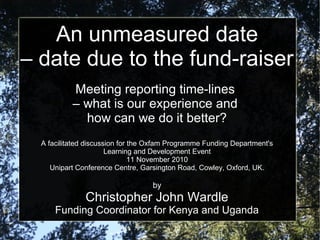
20101111 cj wardle_pfd_lde_presentation+participant_input
- 1. An unmeasured date – date due to the fund-raiser Meeting reporting time-lines – what is our experience and how can we do it better? A facilitated discussion for the Oxfam Programme Funding Department's Learning and Development Event 11 November 2010 Unipart Conference Centre, Garsington Road, Cowley, Oxford, UK. by Christopher John Wardle Funding Coordinator for Kenya and Uganda
- 2. Overview Background Where is our reporting focus? Is there a problem? If there is a problem, what is its scope? What has worked well? How can we turn this around? Building an evidence base.
- 3. Overview Background Where is our reporting focus? Is there a problem? If there is a problem, what is its scope? What has worked well? How can we turn this around? Building an evidence base.
- 4. Background Experimental role Geographical dislocation from programme team Are the issues I'm facing, unique to this role?
- 5. Audience demographics 23 people representing : Affiliates 3 Regional offices 4 PFD staff 7 In-country fund-raisers 9
- 6. Overview Background Where is our reporting focus? Is there a problem? If there is a problem, what is its scope? What has worked well? How can we turn this around? Building an evidence base.
- 7. Where is our reporting focus? A measure of organisational reporting performance by country and region, is on compliance with <Date due to donor> Scapegoats or heros – where do fund-raisers sit in relation to this measure?
- 8. Overview Background Where is our reporting focus? Is there a problem? If there is a problem, what is its scope? What has worked well? How can we turn this around? Building an evidence base.
- 9. Is there a problem? As you consider the last four donor reports you reviewed: − Did you make the donor submission date for all of them? − Response = 30% 7 of the 23 people represented here, successfully met the date due to donor.
- 10. Overview Background Where is our reporting focus? Is there a problem? If there is a problem, what is its scope? What has worked well? How can we turn this around? Building an evidence base.
- 11. If there is a problem, what is its scope? As you consider the last four donor reports you reviewed: − Was the date due to fund-raiser achieved for all of them? − Response = 8.6% 2 of the 23 people represented here, successfully met the date due to fund- raiser.
- 12. Overview Background Where is our reporting focus? Is there a problem? If there is a problem, what is its scope? What has worked well? How can we turn this around? Building an evidence base.
- 13. What has worked well? (1 of 3) Enabling factors: − What characterised your experience of timely receipt of reports? Participant responses: − Good coordination by fund-raisers (an early warning system) − Assertiveness by fund-raisers − Conscientious Programme Managers − Supportive Country Directors (owning the process) − Key performance Indicators (KPIs) linked to meeting reporting deadlines
- 14. What has worked well? (2 of 3) Enabling factors: −What characterised your experience of timely receipt of reports? Participant responses: − Realistic reporting time-frames − Naming and shaming (accountability) in Donor Reporting Schedule (DRS) − Audits in CRIMSON/HR Gold (under trial) − Initial programmes design covers HR for post- programme reporting
- 15. What has worked well? (3 of 3) Enabling factors: What characterised your experience of − timely receipt of reports? Participant responses: − Team approach (not just leaving it all to the Programme Manager) − Shared responsibility − Lying to programme staff about the real deadlines!
- 16. Overview Background Where is our reporting focus? Is there a problem? If there is a problem, what is its scope? What has worked well? How can we turn this around? Building an evidence base.
- 17. How can we turn this around? Barriers to be overcome: − What were the reasons for missing the <Date due to the fund-raiser> deadline? Solutions: − How can we reverse these barriers?
- 18. Barriers and Solutions (1/2) Lack of positive feedback Awards for quality and mechanisms timeliness of reports Not seen as the PM’s job Motivation by the RD Inadequate staff numbers Better HR management Capacity of team Capacity building (Staff (implementers c.f. selection based on both writers) skills) Poor planning Start-up workshop and information sharing Inadequate data Tools
- 19. Barriers and Solutions (2/2) Weak focus on More feedback to report organisational learning writers culture Lack of clear roles and Reoporting KPIs for responsibilities Programme Managers Poor recognition of Respect affiliate Oxfam affiliate deadlines and factor into needs/interest in the planning reporting process Mind-set/Priority Taking ownership of the reporting process
- 20. Overview Background Where is our reporting focus? Is there a problem? If there is a problem, what is its scope? What has worked well? How can we turn this around? Building an evidence base.
- 21. Building an evidence base. Anecdotal evidence from group discussions A more formal study: − Underpinned by extraction of data from CRIMSON on compliance with donor reporting time-lines; − Comparing this data with the achievement of the respective <Date due to the fund-raiser>; and − Using this as an evidence base for policy change.
- 22. Contact information Christopher John Wardle Funding Coordinator for Kenya and Uganda Mobile: +44 754 764 3944 cwardle@oxfam.org.uk cjwardle@gmail.com Online at Skype, Yammer, facebook, twitter, LinkedIn: <cjwardle>
